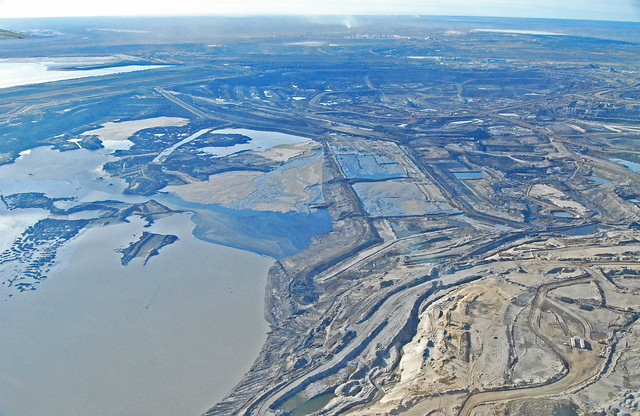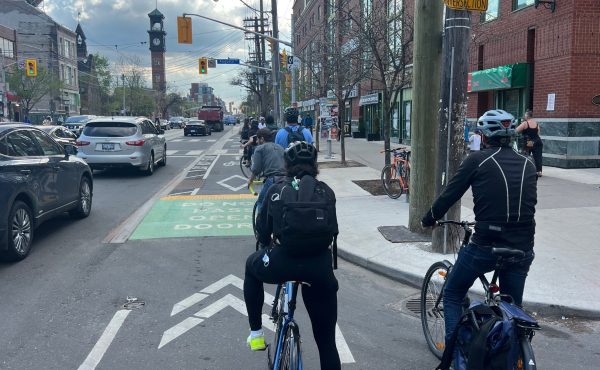This regular online series will feature interviews with fascinating and influential urban thinkers, with a focus on discussing how Toronto can become a more engaged, accessible, and sustainable city.
Jeff Rubin spent 20 years as chief economist for CIBC World Markets. After resigning in 2009, he went on to become the best-selling author of Why Your World Is About To Get a Whole Lot Smaller, a book about the rising price of oil. Spacing sat down with Jeff to discuss the implications of “peak oil” for cities.
Spacing: What is Peak Oil?
Rubin: For me, it doesn’t mean the world is running out of oil in some absolute geological sense. For example, there’s over 170 billion barrels of the stuff in the Alberta Tar Sands. The real question is can we afford to burn it? We’ve exhausted our supply of easy-access, conventional oil and now we’re turning to unconventional sources in shale, tar sands, and deep water. It’s unconventional sources of oil and the prices required to facilitate extraction that are problematic for us. Therefore, to me, “Peak Oil” means the cost of extracting oil is gradually becoming greater than what our economies can tolerate. It’s going to take $150-200 per barrel oil prices to turn the Oil Sands into a 4-5 million barrel per day producer that would meet our needs. Those are simultaneously the kinds prices that when translated into pump prices take millions of people off the road.
Spacing: What are the implications of Peak Oil for commuter travel?
Rubin: If we want to know what our future roadways will look like, we should look at Europe over the last decade where, as a result of taxes, they have been paying gasoline prices equivalent to peak oil. Even Britain, which is somewhat similar to Canada, they drive smaller cars and drive less. The problem is that if we apply European rates of car ownership to Canada, it implies that one in every five drivers is about to take the exit lane. My concern is that if one in five Toronto drivers decided to take the TTC tomorrow, I very much doubt we could accommodate them. My belief is that instead of having given $10 billion to General Motors to stay in business while the automobile industry is in massive decline, we should have invested in public transit for cities.
Spacing: What does it mean for urban planning and city-building?
Rubin: We’re going to have to accommodate a very significant migration of people from the suburbs into the inner cities over the next 20 years. People may want to live in suburbs now because in Richmond Hill you can buy a 3,000 sq. ft home on a huge lot for the same price of a semi-detached in Riverdale. In the future, however, the suburbs aren’t going to be affordable unless you happen to also work where you live. You’re going to spend too much money moving yourself back and forth. The economic foundation of the suburban mentality is predicated on cheap transport fuel. We won’t have that anymore. Public transit in suburbs will also prove ineffective given the lower population densities of the suburbs. Whether we like it or not, we’re going back to the cities.
Spacing: How does cycling fit in within the whole dynamic?
Rubin: In Copenhagen, every major street has bike lanes. But why do people in Copenhagen ride bikes? I originally thought it was because they are physically active or environmentally conscious people. I then inquired about how much it costs to buy a car. It turns out that in Denmark you pay a surcharge which, depending on horsepower, can be anywhere from 50% to 150% of a car’s sticker price. It’s a government-levied tax on car ownership. In Copenhagen, you can pay upwards of three times the amount for a car as in Toronto. If you want to see more bikes on Toronto roads then wait until oil prices make it that much more expensive to own a car.
It’s the same with wind power. Denmark reduced its carbon emissions to less than its 1990 levels. We always hear about the 20% power generation from renewables. What we’re unaware of is that the remaining 80% comes from coal. So then how did Denmark reduce emissions while relying on coal for 80% of its power? The answer is the price of power. On average it’s 30¢ kw/h or three times what Ontarians pay. Denmark reducing its emissions has everything to do with people using less power because of prices.
Spacing: Based on your analysis, is the GTA ready to adapt to peak oil?
Rubin: I don’t know if it’s ready, but it will adapt because that future is staring us in the face. By the end of the year we’re looking at $1.50 gasoline. The way Toronto will run with those prices will be very different from today. We’re going to start having to make some changes. First we need to give up the foolish perception that we have a natural birthright to consume as much energy as we can.
As an economist, I believe people respond in rational ways to prices. Triple-digit oil prices will show us how to respond and hopefully our politicians get it. The fact is that, in the future, more people will be taking public transit and less people will be driving. That change won’t be a result of any alleged “War on the Car.” The biggest war on the car is coming from $2/litre fuel.
Why Your World Is About To Get A Whole Lot Smaller is now available in paperback in bookstores across Canada.
photo by NWF Blogs





15 comments
I’d like to know how synthetic petroleum products factor in any Peak Oil calculations. Once oil & gas prices justify the cost of creating synthetics won’t we just get caught a trap of producing expensive synthetic products that consume almost as much energy being made as they create? If synthetic products become viable, would there be a levelling off of energy prices based on those new technologies? Does new technology just stretch the time line for some kind of tipping point, or could it be a game changer?
The TTC commissioners and the Ford brothers don’t listen to Jeff Rubin. If they did, then we wouldn’t be cutting back bus service on 41 bus routes on May 8th. Also, we be building the LRT routes to replace the diesel burning buses, the fuel of which comes from oil as well.
BTW. Crude oil jumped over a dollar today, to over $110 a barrel. It was $83 when Ford was elected and the war on the car was over.
[…] didn’t know which badge to put his interview from Spacing with economist Jeff Rubin. He talks about peak oil, energy prices, urban planning and city […]
If the futures market was limited to actual users oil would be less than $70 per barrel. Jeff might also want to reconsier his assumptions regarding the the costs to extract oil from the tar sands. There are technologies in the pipeline that are going to ratttle all his arguments. Jeff might want to google Daniel Dicker or do some snooping of recent patents.
Thanks for a super helpful overview of a complex subject.
Gotta love the commenter above — Glen — telling Rubin how to do research! I would encourage this Glen character to write a book or get a job as chief economist for a national bank before he mouths off.
If futures markets were limited to actual users of oil, then everyone would be looking for $0 oil but of course no one would be willing to sell at that price. So limiting the futures market to only purchasers is obviously pointless.
The “fair” price of oil has to include the risk premium. The chances of bad things happening in the Middle East, disrupting oil supplies, is hardly zero these days. Why should I sell you my barrel of oil for $70 today when I’m thinking that there’s a good probability that you will be desperately seeking oil at any price in six months (when Saudi Arabia blows up)?
Sure, I’d rather have $70 today rather than $70 in six months (which is what would happen if everything calmed right down), but I’d more rather have $160 in six months than $70 today.
By the way, it seems that Daniel Dicker claims that oil prices can be stabilized by regulating the futures market, in the same way the silver futures market was tamed in 1980 by clamping down on speculators.
Contrast and compare what would likely happen if the world encountered a sudden shortage of silver, versus what would likely happen if the world encountered a sudden shortage of oil.
Lisa, You might want to consider the fact the vast majority of economists missed the US housing bubble. Today, there is no recognition of the own we are in right here at home. The few economists that I correspond with were not the ones who had there head in the sand.
Ed, if the futures market was limmited to users and producers oil would not go down to $0. All it would do is find its natural equilibrium. Storys like this demonstrate the stupidity of today’s markets………..
http://ftalphaville.ft.com/blog/2011/03/28/528481/for-the-bots-anne-hathaway-is-not-warren-buffett/
WKLis… we do need improved transit especially in the northEast and northWest corners of this City. It’s quite the stretch r to say that improved transit should only be LRT.
Update to my comment of April 7th. While crude oil was $110 US a barrel on the 7th, on the 8th it went up to $113 US barrel, a 36% increase since October. Luckily (or unluckily, depending on your point of view), the Canadian dollar also went up, cushioning the gasoline price increase a little bit since the crude oil prices are in US dollars.
Mass migration into cities from suburbs? Suck it up, urbanites, Brampton’s moving in?
How about mass conversions of suburbs into cities? Why shouldn’t the properties on the corners become corner stores? Why can’t the strip malls become apartment complexes with retail on the main floor and offices on the second?
The problem with suburbs becoming cities is ZONING. As long as zoning outlaws corner stores, outlaws basement apartments, outlaws mixing use buildings, outlaws medium-rise buildings, outlaws just about all that cities have, suburbs are and continue to be prevented from becoming cities.
While I have no problem with increasing the cost of owning a car, it is quite ridiculous to claim that the cost of owning a car is the main reason why so many Danes cycle. Many towns in Germany have high levels of cycling and there is no such tax on cars. The Netherlands has along the highest level of car ownership in Europe and the highest levels of cycling.
People ride bicycles because they enjoy it and it can a very effective form of transportation for shorter trips.
The key is the investment in high quality separated cycling facilities, not the price of car ownership.
WKLis… disagree with you regarding LRT’s as only transit solution.. but agree with you that ZONING is the issue… Would go farther and state that addressing our transit/transportations requires that ZONING needs to be addressed at a REGIONAL level rather than letting each municipality set its own policies for the most part… Only the province can do this.. and unfortunately, while they talk a good game about greater regional coordination… they don’t seem willing to make any moves towards mandating such coordination.